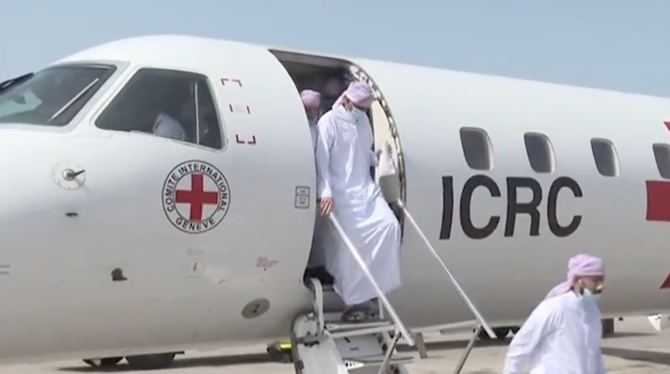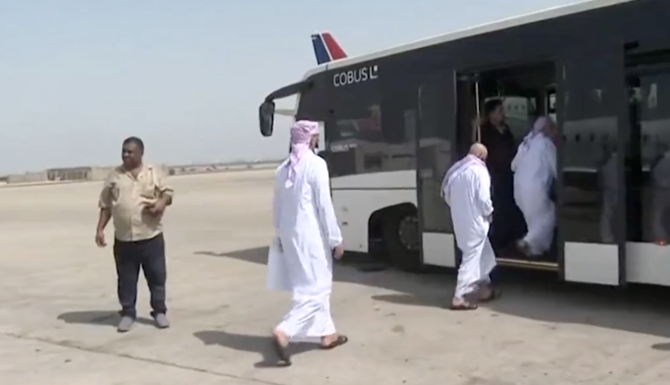AL-MUKALLA: The Coalition to Restore Legitimacy in Yemen released on Friday 163 Houthi prisoners of war and helped send them back to Aden and Sanaa as part of its initiative to pave the way for ending the conflict in the country.
A total of 108 were transferred to Aden, the interim capital of Yemen, while nine were transferred to the Houthi-held Sanaa. Nine foreign fighters, captured while fighting alongside the Houthis, were be handed to embassies of their countries. The coalition also transferred by land 37 wounded fighters to their home provinces in Yemen.
The coalition on Friday morning announced the departure of the first flight carrying dozens of Houthi prisoners from Saudi Arabia to Yemen, among three phases of the process to transfer the prisoners to Sanaa and Aden.
The International Committee of the Red Cross is facilitating the transfer of over 100 detainees from Saudi Arabia to Yemen in three planes.
Basheer Omar, the spokesperson for the ICRC delegation in Yemen, told Arab News that the destinations of released prisoners were determined by their place of origin, current homes, personal wishes and security concerns to help them arrive safely at their homes, adding that around 80 detainees arrived in Aden by Friday afternoon.
Yemeni government officials who handle prisoners of war said prisoners who arrived in Aden would be taken by buses and cars to their villages and cities after the Houthis refused to receive them in Sanaa.
Majed Fadhail, Yemen’s deputy minister of human rights and a member of a government delegation involved in prisoner swap talks with the militia, thanked Saudi Arabia for the humanitarian initiative, saying the Houthis wanted to free their military leaders held by the coalition.
“The Houthis were seeking the release of big heads and some Hashemite fighters,” Fadhail said, urging the Houthis to reciprocate the coalition’s move by releasing thousands of Yemenis held inside their prisons. “I hope that this initiative will accelerate the completion of the prisoner exchange deal,” he added.
The latest efforts to achieve another major prisoner swap between the Houthis and the internationally recognized government reached a deadlock after the militia proposed swapping their fighters held by the government with civilians snatched from the streets of Sanaa.
In October 2020, warring factions in Yemen swapped more than 1,000 detainees, brokered by the UN in the first major prisoner exchange since the beginning of the war.
The coalition’s prisoner initiative is happening as international pressure increases on Yemeni parties to hold the current two-month UN-brokered truce, amid reports of hundreds of violations, including a Houthi drone strike in Taiz.
Richard Oppenheim, UK ambassador to Yemen, said the UN-brokered truce was helping ease the aggravating humanitarian crisis in Yemen, and was opening doors to achieving peace, urging the Yemeni parties to honor their commitments to end the fighting.
“We join international calls for all parties to uphold their truce commitments, including by relieving years of siege-like conditions that have created a humanitarian catastrophe for hundreds of thousands of people in and around Taiz and by re-opening Sanaa airport,” he tweeted.
The French Embassy in Yemen expressed its concerns over delays in opening the airport in Sanaa, and the Houthi siege of the Taiz, urging the various factions to work in good faith to alleviate the suffering of Yemenis across the country by supporting the truce.
“After more than seven years of war, everything must be done to alleviate the suffering of the Yemeni people, whether in Taiz or elsewhere in the country. This requires upholding the truce by all parties for the good of all Yemenis,” the embassy tweeted.
The Yemeni government said the Houthis had committed 341 violations of the truce from April 30 to May 4, during the Eid break, by attacking and firing missiles at government-controlled cities and army locations in Taiz, Marib, Jouf, Dhale, Saada, Abyan and Hodeidah.
On Wednesday, at least 10 civilians were wounded when an explosive-laden drone launch by the Houthis hit a security center for government forces in the southern city of Taiz.
Meanwhile, the Organization of Islamic Cooperation (OIC) said on Saturday that it has welcomed the decision to release the 163 Houthi prisoners, who were sent back as part of Saudi Arabia’s humanitarian initiative.
The OIC also said it hopes to continue efforts that will encourage a truce in Yemen in order to reach a comprehensive political solution.


























